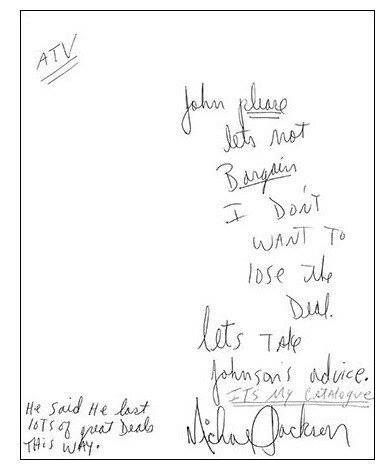HIStory
Proud Member
- Joined
- Jul 25, 2011
- Messages
- 0
- Points
- 0
Petrarose;4016756 said:ALLMEDIANY: Lines in his autobiography helped channel him into Michael Jackson, Inc., but did you have any inquiries he could’ve answered?
Z.O.G.: I think I would’ve asked him what stopped him from touring more or putting out music more frequently toward the end of his life. My feeling is, the answer is he didn’t think it was good enough, or that it wasn’t up to his incredibly exacting standards—but I would’ve been curious to hear what he said.
You know ^^ he keeps saying his perfectionism was the reason he did not tour much or make many albums. I always filter in the effects of the allegations and media persecution which drained his spirit, emotions, energy, and his sleeping problems. If you are not at peace internally, how are you going to create good songs or get the motivation to create new music, dance, and even go on tour? I don't think perfectionism is the only thing that stood in his way. Also, I think in the beginning he deliberately spaced his album/touring activities. Later in life, I think external factors, like the allegations played a role. I guess Zack is a business/financial major, so these mental/emotional issues were not factored in. Also, he may not want to mention the media's culpability since he is a writer and needs the media.
I agree with this completely. I have not yet read the book (but I plan to buy it), but to say it was his perfectionism that was his downfall or that hindered him putting out more albums and touring more, that's a bit too simplicistic. Like Greenburg said in an earlier interview right before the allegations hit in 1993 Michael was into movie making, that was the direction that he was trying to go, but then the allegations ruined those plans. Who knows how far he could have gone on that area? Although, objectively I don't think he was by far as talented of an actor as he he was a musician, but of course, acting isn't the only thing he could have done in movies. For one, I think he could have been involved in Dreamworks with Spielberg and Co. and we know how highly successful that company became.
Also he stopped touring the US altogether and IMO that also had a lot to do with the allegations. As well as the fact that often critics unfairly trashed his music. Actually often reviews did not even focus on the music but were full of ad hominem attacks. So of course, with that then you can lose confidence and motivation and you become more worried about putting out anything new.
I always hear other people say he wanted to top Thriller, but have any of you guys ever heard Michael say that? I am curious. I know the media and everyone who talks to him mention how something was not like Thriller, but when did Michael say it? I could see him saying such and such an album will sell XYZ amount.
The only thing I can remember that note before Bad about wanting to sell 100,000,000 copies of it. I think it's things like that from which people conclude he was chasing Thriller. I think he set such goals for himself to motivate himself, but I don't think he really considered it a tragedy if his follow-up albums did not outsell Thriller. IMO he understood what a great phenomenon Thriller was and how hard it would be to outsell it. If he had been chasing Thriller that much as claimed then he would not have evolved musically. He would have tried to stick to the Thriller sound and recreate that and instead of leaving Quincy he would have kept working with him. In actuality, all of his subsequent albums sound different to Thriller. He evolved and he made brave steps in trying new things and working with new people. So it's not like the media says that he kept chasing and tried to recreate Thriller all his life. Commercially he did have that desire, but artistically he did not attempt to recreate Thriller.


